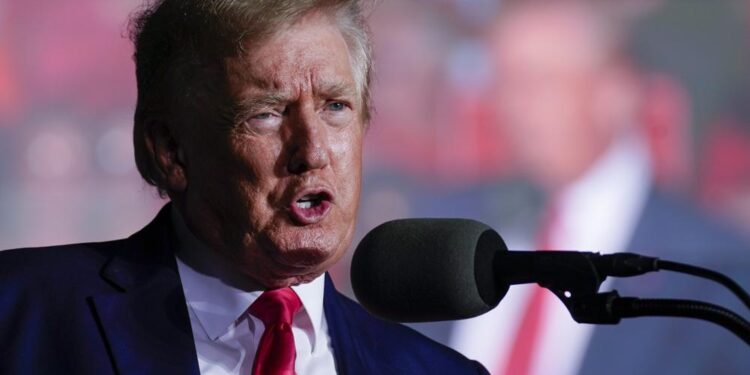WASHINGTON (AP) — The Justice Department on Thursday submitted to a judge proposed redactions to the affidavit it relied on when federal agents searched the Florida estate of former President Donald Trump to look for classified documents.
U.S. Magistrate Judge Bruce Reinhart will decide whether the sealed FBI affidavit, which presumably lays out a detailed factual basis for the search, will become public — and if so, how much is disclosed.
“The United States has filed a submission under seal per the Court’s order of Aug. 22,” Justice Department spokesman Anthony Coley said in a statement. “The Justice Department respectfully declines further comment as the Court considers the matter.”
Reinhart had given the department until Thursday at noon to propose to him the redactions to the affidavit it wanted to make before any portion of it was released to the public. But he acknowledged on Monday that it was possible that the redactions, or blacked-out portions, would be so extensive as to leave the public version of the document without any meaningful information.
The affidavit is likely to contain key information about the FBI’s basis for executing a search warrant at Mar-a-Lago in Palm Beach on Aug. 8. Documents already made public as part of the investigation show that the FBI retrieved from the property 11 sets of classified documents, including information marked at the top secret level.
The documents also showed that the FBI was investigating the “willful retention of national defense information,” the concealment or removal of government records and obstruction of a federal investigation.
Multiple news media organizations, including The Associated Press, argued in court last week for the disclosure of the affidavit, citing the extraordinary public interest in the federal search of a former president’s home. Trump and some of his supporters have also encouraged the document’s release.
The media coalition responded to Thursday’s filing by asking the judge to unseal portions of the department’s brief and to direct the government, “going forward,” to file publicly a redacted version of any sealed document it submits. The groups noted that significant information about the investigation is already public.
“At a minimum, any portions of the Brief that recite those facts about the investigation, without revealing additional ones not yet publicly available — in addition to any other portions that pose no threat to the investigation — should be unsealed,” the news organizations wrote.
They added: “If and when additional facts come to light and are confirmed to be accurate, or certain facts no longer pose a threat to the investigation for any other reason, there is no justification for maintaining them under seal either.”
The Justice Department has opposed the release, saying the disclosure risks compromising an ongoing criminal investigation, revealing information about witnesses and divulging investigative techniques.
Reinhart has said that though he was sensitive to the department’s concerns, he was not inclined to keep the entire document sealed and directed officials to submit to him redactions of the document reflecting the information it wants to keep secret.





























